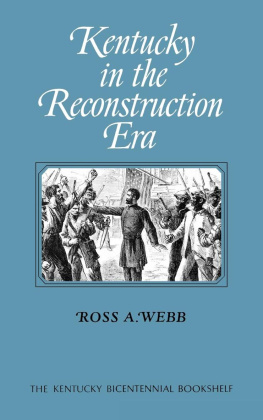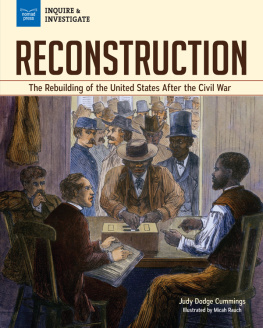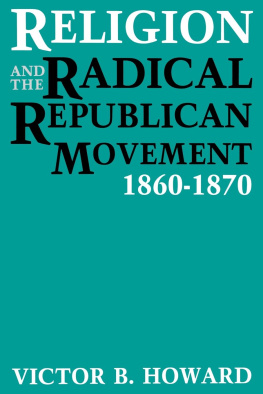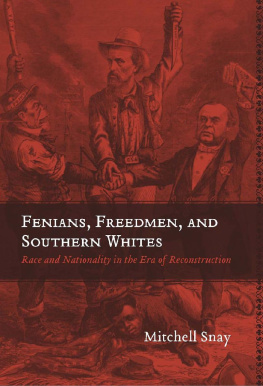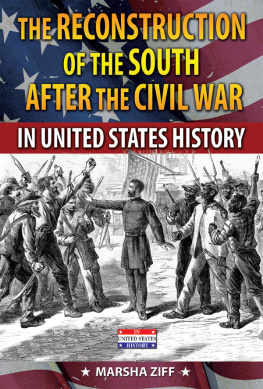The Kentucky Bicentennial Bookshelf Sponsored by
KENTUCKY HISTORICAL EVENTS CELEBRATION COMMISSION KENTUCKY FEDERATION OF WOMENS CLUBS
and Contributing Sponsors
AMERICAN FEDERAL SAVINGS & LOAN ASSOCIATION
ARMCO STEEL CORPORATION, ASHLAND WORKS
A. ARNOLD & SON TRANSFER & STORAGE CO., INC./ASHLAND OIL, INC.
BAILEY MINING COMPANY, BYPRO, KENTUCKY/BEGLEY DRUG COMPANY
J. WINSTON COLEMAN, JR./CONVENIENT INDUSTRIES OF AMERICA, INC.
IN MEMORY OF MR. AND MRS. J. SHERMAN COOPER BY THEIR CHILDREN
CORNING GLASS WORKS FOUNDATION/MRS. CLORA CORRELL
THE COURIER-JOURNAL AND THE LOUISVILLE TIMES
COVINGTON TRUST & BANKING COMPANY
MR. AND MRS. GEORGE P. CROUNSE/GEORGE E. EVANS, JR.
FARMERS BANK & CAPITAL TRUST COMPANY/FISHER-PRICE TOYS, MURRAY
MARY PAULINE FOX, M.D., IN HONOR OF CHLOE GIFFORD
MARY A. HALL, M.D., IN HONOR OF PAT LEE,
JANICE HALL & MARY ANN FAULKNER
OSCAR HORNSBY INC./OFFICE PRODUCTS DIVISION IBM CORPORATION
JERRYS RESTAURANTS/ROBERT B. JEWELL
LEE S. JONES/KENTUCKIANA GIRL SCOUT COUNCIL
KENTUCKY BANKERS ASSOCIATION/KENTUCKY COAL ASSOCIATION, INC.
THE KENTUCKY JOCKEY CLUB, INC./THE LEXINGTON WOMANS CLUB
LINCOLN INCOME LIFE INSURANCE COMPANY
LORILLARD A DIVISION OF LOEWS THEATRES, INC.
METROPOLITAN WOMANS CLUB OF LEXINGTON/BETTY HAGGIN MOLLOY
MUTUAL FEDERAL SAVINGS & LOAN ASSOCIATION
NATIONAL INDUSTRIES, INC./RAND MCNALLY & COMPANY
PHILIP MORRIS, INCORPORATED/MRS. VICTOR SAMS
SHELL OIL COMPANY, LOUISVILLE
SOUTH CENTRAL BELL TELEPHONE COMPANY
SOUTHERN BELLE DAIRY CO. INC.
STANDARD OIL COMPANY (KENTUCKY)
STANDARD PRINTING CO., H. M. KESSLER, PRESIDENT
STATE BANK & TRUST COMPANY, RICHMOND
THOMAS INDUSTRIES INC./TIP TOP COAL CO., INC.
MARY L. WISS, M.D./YOUNGER WOMANS CLUB OF ST. MATTHEWS
Kentucky in the
Reconstruction Era
ROSS A. WEBB
Research for The Kentucky Bicentennial Bookshelf is assisted by a grant from the National Endowment for the Humanities. Views expressed in the Bookshelf do not necessarily represent those of the Endowment.
Copyright 1979 by The University Press of Kentucky
Paperback edition 2009
The University Press of Kentucky
Scholarly publisher for the Commonwealth,
serving Bellarmine University, Berea College, Centre
College of Kentucky, Eastern Kentucky University,
The Filson Historical Society, Georgetown College,
Kentucky Historical Society, Kentucky State University,
Morehead State University, Murray State University,
Northern Kentucky University, Transylvania University,
University of Kentucky, University of Louisville,
and Western Kentucky University.
All rights reserved.
Editorial and Sales Offices: The University Press of Kentucky
663 South Limestone Street, Lexington, Kentucky 40508-4008
www.kentuckypress.com
Cataloging-in-Publication Data is available from the Library of Congress.
ISBN 978-0-8131-9315-1 (pbk: acid-free paper)
This book is printed on acid-free recycled paper meeting the requirements of the American National Standard for Permanence in Paper for Printed Library Materials.
Manufactured in the United States of America.
| Member of the Association of
American University Presses |
For Ruth, Eric, and Alan
Contents
Acknowledgments
I AM INDEBTED to a number of individuals for their support and assistance in the preparation of this booksome of whom shall remain anonymous since they would be embarrassed by public notice. However, I wish to express my gratitude to the staff of the Dacus Library of Winthrop College, as well as to the staffs of the Margaret I. King Library of the University of Kentucky, the Kentucky Historical Society Library, the Filson Club Library, the Public Library of Cincinnati and Hamilton County, the New York Public Library, and the National Archives. I would also express my appreciation to the Winthrop College Research Council, which generously made possible a number of research trips to gather necessary materials. The Johns Hopkins University Press graciously granted permission to use materials from my essay Kentucky: Pariah among the Elect, which appeared in Richard O. Curry, ed., Radicalism, Racism, and Party Realignment: The Border States during Reconstruction, Baltimore, copyright 1969 by The Johns Hopkins Press.
I am indebted to my colleague, Professor Arnold M. Shankman, who read and criticized the manuscript. Especially I would thank Professor Frederick M. Heath for his encouragement and interest; Dr. Elaine Everly for assistance with the Freedmens Bureau records; Dr. Jacqueline Bull, Dr. Hambleton Tapp, and Dr. James C. Klotter for helpful suggestions and comments; my student assistants Lawrence A. Bosc, Rebecca Jane Ferguson, and Patricia Sullivan for checking sources, typing, and correcting draft materials; Louise Taylor and Judy Faile for typing the manuscript; and finally my family who permit my devotion to Clio.
1
INTRODUCTION
THE YEARS IMMEDIATELY following the Civil War, commonly called the reconstruction era, were filled with great stress, conflicting emotions, and fundamental societal problems relating to race, equality, and democracy.
Much of the writing about this period lacks objectivity, since the authors of any generation find it difficult to shake off the prejudices of their day. While much that has been written about the history of reconstruction is true, much of it is false, or a mixture of true and false, resulting in some very strained historical interpretations. This should come as no surprise, because the need for a defeated people to find psychological compensation for a humiliating loss is very great, particularly when there is the additional burden of guilt for slavery and secession to be borne. On the other hand, the victors experienced guilt as well and sought justification for the despoiling activities of Union armies and the corruption of postwar reconstruction governments in the South.
On April 9, 1865, having concluded that he could accomplish nothing more by fighting, Confederate General Robert E. Lee had gone to meet Union General U. S. Grant at Appomattox Courthouse to sue for peace. Grant not only accepted Lees surrender but generously permitted the Confederate soldiers to keep their horses and mules, issued them rations, and forbade victory celebrations out of deference to Lees defeated army. The war is over, Grant admonished; the rebels are our countrymen again.

